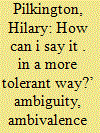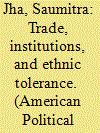| Srl | Item |
| 1 |
ID:
140429


|
|
|
|
|
| Summary/Abstract |
Although survey data identify no significant predictor of intolerance among the Russian population, young people are considered to display heightened levels of ethnic intolerance and radical variants of xenophobia. Drawing on survey and semi-structured interview data from a study of patriotism among young people in two cities in the North-West region of Russia, this article explores the strength of ethnic self-identification and ethnically exclusive notions of Russianness and compares levels and forms of ethnic intolerance. Identifying that routine expression of xenophobic sentiments coexists alongside a commitment to principles of ethnic equality, the article considers what the ambiguities and contradictions in the articulation of intolerance tell us about how young people negotiate complex contemporary multicultural societies.
|
|
|
|
|
|
|
|
|
|
|
|
|
|
|
|
| 2 |
ID:
130905


|
|
|
|
|
| Publication |
2014.
|
| Summary/Abstract |
THE INTEGRATION PROCESSES, which have passed to the stage of concrete implementation in the Customs Union format, are now, in a sense, an indicator of stability for the member countries' national and state identity. A policy of ethnic tolerance and social solidarity ensures domestic stability. Kazakhstan's citizens are members of more than 100 ethnic groups and 17 religious confessions. Building a political nation has become the basis for shaping national andstate identity in Kazakhstan. A strong economy, ethnic and religious harmony, and patriotism are to be a response to the challenges of modernity.
|
|
|
|
|
|
|
|
|
|
|
|
|
|
|
|
| 3 |
ID:
127835


|
|
|
|
|
| Publication |
2013.
|
| Summary/Abstract |
I provide evidence that the degree to which medieval Hindus and Muslims could provide complementary, nonreplicable services and a mechanism to share the gains from exchange has resulted in a sustained legacy of ethnic tolerance in South Asian towns. Due to Muslim-specific advantages in Indian Ocean shipping, interethnic complementarities were strongest in medieval trading ports, leading to the development of institutional mechanisms that further supported interethnic exchange. Using novel town-level data spanning South Asia's medieval and colonial history, I find that medieval ports, despite being more ethnically mixed, were five times less prone to Hindu-Muslim riots between 1850 and 1950, two centuries after Europeans disrupted Muslim overseas trade dominance, and remained half as prone between 1950 and 1995. Household-level evidence suggests that these differences reflect local institutions that emerged to support interethnic medieval trade, continue to influence modern occupational choices and organizations, and substitute for State political incentives in supporting interethnic trust
|
|
|
|
|
|
|
|
|
|
|
|
|
|
|
|